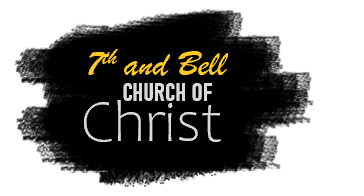
Before Time Began
The bible is not really a book about things that were before the earth and all that is in it was created, this becomes evident when the text opens with “In the beginning, God created the heavens and the earth.” However, the bible is a book that details God’s one plan, His specific plan, to redeem man from their sins. And because this great plan actually began before the creation of all things, the bible does reveal to us a number of precious gems of information about things “before time began” as they relate to the salvation of man.
Before time began, of necessity, there was God. Man cannot be redeemed, let alone created, without One so mighty and so wise to hold the title “God,” i.e. deity. The psalmist exclaimed, “Before the mountains were brought forth, or ever You had formed the earth and the world, even from everlasting to everlasting, you are God” (90:2). God did not come into existence a few days, months, or years before He created the world, for He is “from everlasting.” The statement “You are God” is not in reference to His existence, but that “from everlasting” He has always been divine. He did not grow to power, wisdom, and glory (John 17:5), for He has been the same “from everlasting.” Just like the Hebrew letter declares: “Jesus Christ is the same yesterday, today, and forever” (Hebrews 13:8).
Before time began, there was wisdom. Proverbs 8:22-31 is truly fascinating reading. It is written from the perspective of a female personification (i.e. the representation of a thing in the form of a person) of wisdom. The text teaches us that wisdom was “established from everlasting, from the beginning, before there was ever an earth,” and God possessed this everlasting wisdom “at the beginning of His way, before His works of old.” It was through wisdom that God designed and created the heavens and the earth, and wisdom is called God’s “master craftsman” in the text.
Before time began, there was foreknowledge. Anyone who has spent a little time in the Old Testament has witnessed God’s foreknowledge of things to come. Isaiah said that God “declares the end from the beginning” (46:10). Paul told the Romans that God “calls those things which do not exist as though they did” (4:17), referring to the way God spoke in the Old Testament, providing exhaustive detail of things long in the future as if they were happening right then and there. Paul even told the Athenians that God preappointed the times and boundaries of every nation that has come into existence and will come in the future (Acts 17:26). All this is incredible, but how far back does God’s foreknowledge really go? The Bible reveals that His foreknowledge existed before time began, in fact, it has eternally existed: “Known to God from eternity are all His works” (Acts 15:18). God has known for all eternity everything that would take place upon this earth and beyond this globe. This includes His previous knowledge of our sins and His understanding that we would need a Savior.
Before time began, there was an eternal purpose. Paul told the Ephesians in 3:8-11 that God had an eternal purpose which included them, as well as us today. Paul states that he was preaching a revealed mystery, a mystery that had “been hidden in God” even “from the beginning of the ages,” but has now been “made known” through the manifestation of the church. For ages, the prophets of old and even the angels in heaven have desired to understand the mystery of God’s plan (1 Peter 1:12), and now the “principalities and powers in the heavenly places” (Eph. 3:10) can finally see it as clear as day through the church of Christ. A look at the church will show the “manifold wisdom of God,” how God, from the beginning, set His plan in motion and the final result of His plan is the establishment of the church, the saved of the earth. God’s “eternal purpose,” long before the creation, was always the salvation of men. This “He accomplished in Christ Jesus” (v. 11) by His sacrifice and resurrection. The church is proof positive that God’s plan works!
Before time began, there was grace. 2 Timothy 1:8-10 tells us that God knew before time began that man could not obtain salvation “according to our works,” for if that were the case all our works would have to be sinless. But all of us have sinned (Romans 3:23; 1 John 1:8). Therefore, it was according to His “grace” (i.e. freely given love and kindness to recipients who are not worthy of it) that He planned man’s salvation. God’s “grace,” according to the text was “given to us in Christ Jesus” (through His sacrifice).
Before time began, the sacrifice was chosen. 1 Peter 1:18-20 explains that Jesus was “foreordained before the foundation of the world” to be the sacrificial “lamb without blemish and without spot.” Foreordained simply means pre-chosen, or decided beforehand, indicating that Jesus was chosen to be the sacrifice for man’s sins before the existence of earth’s foundation. So far in this study, it is safe to conclude that everything about the salvation of man was entirely decided before God, the Word, said “let there be light.”
Before time began, there was a promise made. The promise of eternal life. The mind-blowing text of Titus 1:2 shows us that the promise of eternal life was not made when Jesus was raised from the dead, nor at the cross, nor at His birth upon this earth. It was not made when David was king of Israel, nor in the days of Moses, Judah, Jacob, Isaac, Abraham, Noah, or even Adam. The promise was made before man, “before time began.” How could one not be in awe of this fact? God’s plan of salvation was so set in stone since eternity that God was able to make the promise to redeem man from sin even before man first sinned.
Before time began, a kingdom was prepared. Not only was the promise of eternal life given before time, but the place where one would enjoy eternal life had also been appointed since “the foundation of the world” (Matthew 25:34). There can be no question that God has made every preparation to save our souls, but who does need to be questioned? Have we made preparation in our heart in obedience to the word of God? Have we made the resolution of leaving behind sin and come into a relationship with God through confession of the Lord Jesus (Romans 10:9) and baptism for the forgiveness of sins (Acts 2:38)?
by Tanner Campbell
